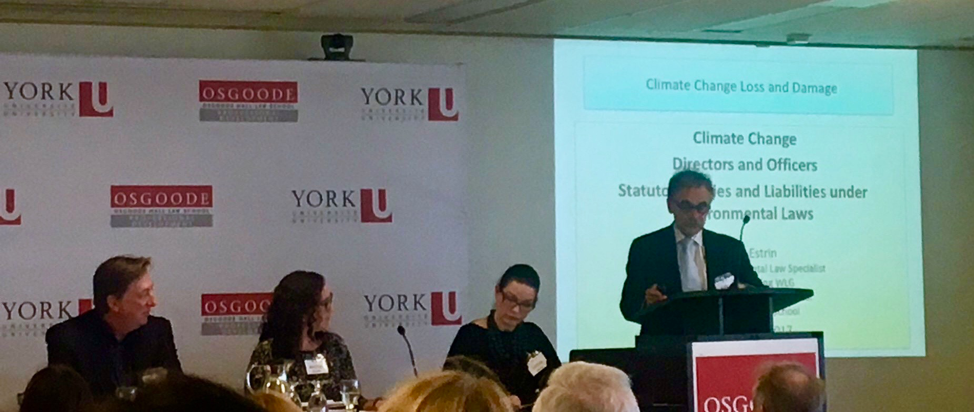 By: Jacklyn Tuckey
By: Jacklyn Tuckey
There’s a new way that environmental groups, organizations and individuals are fighting climate change, and it centres around securities. The trend for decades has been for the majority of companies to more or less ignore climate change signals in order to chase the dollar. The problem lies in the facts they’ve been reluctant to acknowledge: climate change is real, and it poses a real threat to businesses in almost every sector.
Australian corporate lawyer Sarah Barker, of Minter Ellison, advises on managing environmental, social and governance risks, and is particularly well-versed in climate change and securities laws. At an October climate change conference in Toronto called “Directors at Risk” (organized through the Hennick Centre of Osgoode Hall Law School and York University’s Schulich School of Business), Barker said that it is foreseeable that climate change will impact any company that hires people, pays taxes or uses resources. She observed a major issue in directors’ failure to see risks associated with climate change as financial risks, mistaking them instead as purely environmental.
New legal actions have been cropping up in recent months that indicate society will not accept this complacency. In these cases (below), organizations and individuals are holding corporations and investment firms accountable for their inaction on climate change; more specifically, for their failure to adequately consider and report on the risks posed to their business by climate change. And they’re taking the directors and officers down with them.
Securities Suits
In the 2017 case of Guy Abrahams v Commonwealth Bank of Australia, shareholders of the defendant institution sued the Commonwealth Bank of Australia (CBA) for its alleged failure to disclose the risks posed to its business assets by climate change in its 2016 directors’ report. The plaintiffs specifically pointed to the CBA’s investment in the Carmichael coal mine, which they suggested would not seem as wise an investment if risks posed by climate change had been adequately considered. A primary concern cited in discussions about this and other coal investments is a global trend of decreasing demand for coal in the push for renewable energy to reduce emissions, a trend that could eventually render this a “stranded asset.” The CBA got off easy in this case – when it released its 2017 annual report with an inclusion of climate change as a risk material to its ability to execute its strategies, the plaintiffs discontinued their proceedings.
At the public level, 11 NGOs together with Filipino disaster survivors and other individuals, with legal support from Greenpeace, have triggered a first-ever national investigation into the responsibility of fossil fuel companies for human rights impacts, or threats thereof, resulting from climate change. The Philippines Commission on Human Rights began conducting its preliminary conference on December 11th of this year, and it has been announced that public hearings will begin in early 2018.
Attia v Exxon Mobil Corp. is a 2016 lawsuit filed in a U.S. district court by current and past Exxon employees who alleged that in artificially inflating its stock prices, Exxon and its senior officials breached their fiduciary duty to the participants, making their retirement savings investments appear more prudent than they were. The claims of artificial inflation were based on Exxon’s failure to disclose internal reports warning of climate change risk, its failure to adequately account for stranded assets and the allegation that Exxon’s calculations of oil and gas prospect values were based on inaccurate carbon prices.
Another 2016 class action lawsuit was launched in another U.S. district court against Exxon in Ramirez v Exxon Mobil Corp., wherein stockholders alleged that the company had committed securities fraud by producing misleading and materially false public statements in failing to disclose the climate change risks found in internal reports, and in using inaccurate carbon pricing to evaluate gas and oil prospects. These latter two suits were filed not only against Exxon but also its directors and officers, with the plaintiffs looking to hold responsible those who made the decisions affecting their assets.
How Companies Can Protect Themselves
This is the future facing companies and those leading them who refuse to acknowledge climate change as a risk material to their operations. It was widely suggested at the Directors at Risk climate change conference that large corporations and investment institutions should modify business modelling in order to more accurately account for the impacts climate change is likely to have on their assets. This would ideally involve looking not only at a business-as-usual scenario, as many companies are accused of doing when estimating values such as gas and oil, but also a scenario in which global warming is limited to 2°C (per the Paris agreement), and 1.5°C (per the Paris ideal goals). This scenario modelling would cause a business to consider the impacts of such variables as carbon pricing, government initiatives and legislation, and new technology in contemplating the realistic long-term value of current investments.
There seemed to be a near-consensus at the October conference that businesses owe a more thorough evaluation to their shareholders under their fiduciary duty (owed under s122(1) of the Canada Business Corporations Act), and that a major step in achieving this is through education of directors and officers. While these players don’t need to be experts in climate change, they must be able to recognize the gaps in their knowledge in order to ask the right questions.
Jacklyn Tuckey is a second-year law student at Osgoode Hall Law School.

